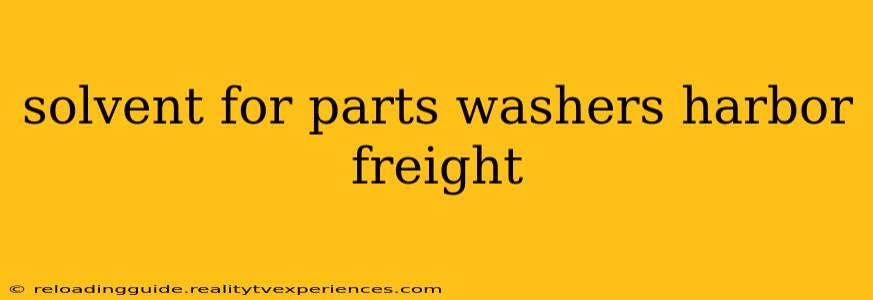Choosing the right solvent for your Harbor Freight parts washer is crucial for effective cleaning and the longevity of your equipment. Using the wrong solvent can damage your parts, clog the system, or even pose safety hazards. This guide will help you navigate the options and select the ideal solvent for your needs.
Understanding Your Harbor Freight Parts Washer
Before diving into solvents, understanding your specific Harbor Freight parts washer model is key. Different models may have varying compatibility with different solvents. Check your owner's manual for specific recommendations and warnings. Pay close attention to any limitations regarding solvent types, flammability, and disposal procedures.
Common Solvents and Their Applications
Several solvents are commonly used in parts washers, each with its own advantages and disadvantages. Let's explore some popular choices:
1. Mineral Spirits (Stoddard Solvent):
- Pros: Relatively inexpensive, readily available, effective at dissolving grease and oil.
- Cons: Flammable, strong odor, may not be effective on heavily ingrained contaminants. Not ideal for delicate parts.
- Best for: General cleaning of moderately soiled parts, particularly metal components.
2. Kerosene:
- Pros: Effective solvent, relatively inexpensive.
- Cons: Highly flammable, strong odor, can leave a residue on some parts. Not suitable for all materials.
- Best for: Cleaning heavily soiled parts, but proceed with caution due to its flammability.
3. Simple Green (and Similar Degreasers):
- Pros: Biodegradable, less harsh on the environment and potentially on delicate parts, often effective on a range of soils.
- Cons: May not be as effective on extremely heavy grease and oil deposits; generally more expensive than petroleum-based solvents.
- Best for: Environmentally conscious cleaning, less aggressive cleaning needs, or when cleaning parts that might be damaged by harsher solvents.
4. Trichloroethylene (TCE):
- Pros: Very effective solvent for heavy grease and oil.
- Cons: Highly toxic and environmentally hazardous. Use is heavily regulated or banned in many regions. Do not use unless explicitly permitted and handled with extreme caution following all safety regulations.
Choosing the Right Solvent: Factors to Consider
Several factors influence your solvent selection:
- Type of Soil: Heavy grease and oil require a stronger solvent than light grime.
- Part Material: Some solvents may damage certain materials (plastics, certain metals).
- Environmental Concerns: Biodegradable options are becoming increasingly popular.
- Safety: Always prioritize safety; use proper ventilation and personal protective equipment (PPE) when handling solvents.
- Local Regulations: Check local regulations regarding solvent disposal and usage.
Safety Precautions: Always Prioritize Safety!
Working with solvents requires diligence. Always:
- Work in a well-ventilated area: Solvents often release fumes that can be harmful.
- Use appropriate PPE: Gloves, eye protection, and respiratory protection are crucial.
- Follow the manufacturer's instructions: Always adhere to the instructions on the solvent container.
- Properly dispose of used solvent: Never pour solvents down the drain; follow local regulations for proper disposal.
Conclusion: Making the Informed Choice
Selecting the appropriate solvent for your Harbor Freight parts washer involves careful consideration of the factors outlined above. Prioritizing safety and understanding the specific needs of your cleaning tasks are paramount. By carefully weighing the pros and cons of each solvent and adhering to safety guidelines, you can ensure efficient and safe cleaning operations. Remember to always consult your parts washer's manual for specific recommendations and warnings.

